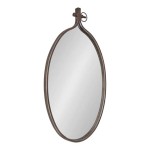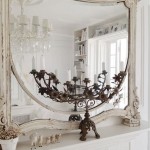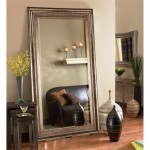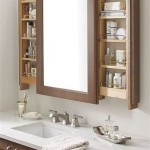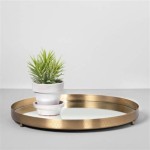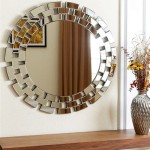Venetian Style Mirrors
Venetian style mirrors represent a distinct category of decorative mirrors renowned for their elaborate and ornate designs. These mirrors draw inspiration from the rich history of glassmaking in Venice, Italy, where the craft reached its peak during the Renaissance and Baroque periods. Venetian mirrors became highly sought-after luxury items, prized for their artistry and the ability to reflect and amplify light within a room.
Authentic Venetian mirrors were traditionally crafted using a specific technique known as "verre églomisé." This process involved applying a thin layer of gold leaf to the back of the glass, creating a reflective surface. The gold was then often embellished with intricate designs etched into the glass, painted details, or further gilding. Murano glass, a product of the Venetian island of Murano, also played a significant role. Known for its clarity and quality, Murano glass was often used as the base for these elaborate creations.
The designs often featured elaborate patterns, incorporating elements such as floral motifs, scrolling acanthus leaves, and geometric shapes. Mythological figures, cherubs, and other symbolic imagery were also common themes. Frames were typically made of wood, sometimes gilded or painted to complement the mirror's design. The overall aesthetic was one of opulence and grandeur, reflective of the wealth and artistic sensibilities of the Venetian Republic.
While original antique Venetian mirrors are rare and highly valuable, modern interpretations of the style are readily available. Contemporary Venetian style mirrors aim to capture the essence of the traditional designs, though they may utilize different techniques and materials. For instance, instead of authentic gold leaf, manufacturers might use silvering or other metallic finishes to achieve a similar reflective effect. Etching and painting are still common decorative techniques, allowing for a range of intricate designs.
The frames of modern Venetian style mirrors are often crafted from wood or resin, designed to evoke the ornate carvings and gilded finishes of antique examples. Materials like wood composites and molded plastics can provide more affordable alternatives while still achieving an elaborate aesthetic. The variety of materials and manufacturing processes allows for a wider range of price points, making Venetian style mirrors accessible to a broader market.
Venetian style mirrors can enhance a variety of interior design styles. Their ornate designs add a touch of classic elegance to traditional settings, complementing antique furniture and rich fabrics. In more contemporary spaces, a Venetian style mirror can serve as a statement piece, introducing a sense of history and artistry. Their reflective qualities can also help to brighten a room and create an illusion of spaciousness, particularly in smaller areas.
When selecting a Venetian style mirror, several factors should be considered. The size and shape of the mirror should be proportionate to the surrounding space and furniture. The design and level of ornamentation should complement the overall aesthetic of the room. The quality of the materials and construction should also be taken into account, ensuring durability and longevity. Examining the frame's details, the clarity of the glass, and the precision of the decorative elements can help assess a mirror's quality.
The reflective surface of a Venetian style mirror can be incorporated effectively into the overall lighting design of a room. Positioning the mirror to reflect natural light from windows can brighten the space and create a more inviting atmosphere. It can also be used to reflect artificial light sources, such as chandeliers or sconces, amplifying their illumination and enhancing the ambiance.
Caring for a Venetian style mirror involves regular cleaning and maintenance. Dusting the frame and the mirror surface with a soft cloth can prevent the buildup of grime and preserve the finish. Avoid using harsh cleaning chemicals that could damage the frame or the reflective backing. For stubborn stains or dirt, a slightly damp cloth can be used, followed by immediate drying. Proper care and maintenance can ensure that a Venetian style mirror retains its beauty and elegance for years to come.
The enduring appeal of Venetian style mirrors lies in their unique blend of artistry and functionality. Their decorative designs add a touch of elegance and sophistication to any space, while their reflective qualities enhance the brightness and perceived size of a room. Whether an antique original or a modern interpretation, a Venetian style mirror serves as a timeless piece of decor, reflecting both history and style.

Fratelli Tosi Venetian Mirror 360 Buy On Select Interior World In United States Us And

Spotted Venetian Style Mirrors

The History Behind Venetian Mirrors Murano Glass Vintage

Venetian Style Mirror Tiara Mg 080009 Glass Mirrors Wall

Venetian Mirrors Large Frameless Glass Soraya Interiors

Venetian Mirror Beveled French Style Hand Craft Art 091

Venetian Mirror Venezianische Spiegel Schlafzimmer Wandspiegel

Very Large Baroque Style Venetian Mirror With Murano Glass Italian Lighting Center

Large Venetian Style Mirror Kernow Furniture

Venetian Mirror Wall Glass Frameless Clear Crown Vanity Style Vintage Home Deco

